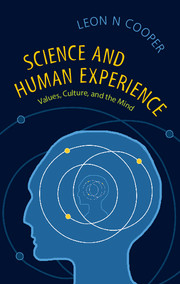Book contents
- Frontmatter
- Dedication
- Contents
- Preface
- Acknowledgement
- Part One Science and Society
- 1 Science and Human Experience: (Mephistopheles Is Alive and Well and Living in the Space Age)
- 2 Does Science Undermine our Values?
- 3 Can Science Serve Mankind?
- 4 Modern Science and Contemporary Discomfort: Metaphor and Reality
- 5 Faith and Science
- 6 Art and Science
- 7 Fraud in Science
- 8 Why Study Science? The Keys to the Cathedral
- 9 Is Evolution a Theory? A Modest Proposal
- 10 The Silence of the Second
- 11 Introduction to Copenhagen
- 12 The Unpaid Debt
- Part Two Thought and Consciousness
- Part Three On the Nature and Limits of Science
- References
3 - Can Science Serve Mankind?
from Part One - Science and Society
Published online by Cambridge University Press: 05 November 2014
- Frontmatter
- Dedication
- Contents
- Preface
- Acknowledgement
- Part One Science and Society
- 1 Science and Human Experience: (Mephistopheles Is Alive and Well and Living in the Space Age)
- 2 Does Science Undermine our Values?
- 3 Can Science Serve Mankind?
- 4 Modern Science and Contemporary Discomfort: Metaphor and Reality
- 5 Faith and Science
- 6 Art and Science
- 7 Fraud in Science
- 8 Why Study Science? The Keys to the Cathedral
- 9 Is Evolution a Theory? A Modest Proposal
- 10 The Silence of the Second
- 11 Introduction to Copenhagen
- 12 The Unpaid Debt
- Part Two Thought and Consciousness
- Part Three On the Nature and Limits of Science
- References
Summary
The naïve scientific optimism of the nineteenth century has been replaced by cynicism regarding the ability of science to serve mankind. Some blame science for the breakdown of the social order of an idealized past. Does science serve mankind, or does mankind serve science?
This essay is based on a talk given at the opening ceremony of the conference “Science in the Service of Mankind,” Vienna, Austria, July 8-14, 1979.
The scientific optimist who wrote in the 1808 Elements of Natural Philosophy: “The great object of science is to ameliorate the condition of man, by adding to the advantages which he naturally possesses,” is no longer with us. He has been replaced by the environmentalist, the conservationist, the consumer advocate, and the professional demonstrator who criticize every aspect of science and most other human activities – who, regarding the splendor of this gathering and the obvious prosperity of its participants, might suggest that the appropriate question is: Can mankind afford to continue to serve science?
As is evident from the topics covered in this conference, in a material sense science has provided, and continues to provide, solutions for many problems. It is obvious that life as we have come to expect it would not be possible without the material fruits of science.
- Type
- Chapter
- Information
- Science and Human ExperienceValues, Culture, and the Mind, pp. 37 - 40Publisher: Cambridge University PressPrint publication year: 2014



